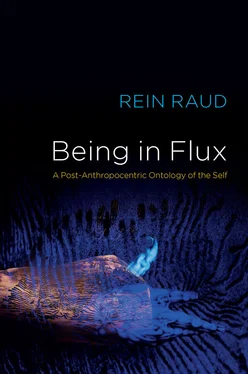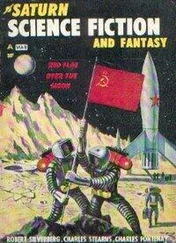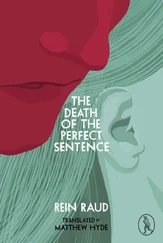1 Cover
2 Title Page Being in Flux A Post-Anthropocentric Ontology of the Self Rein Raud polity
3 Copyright Page Copyright Page Copyright © Rein Raud 2021 The right of Rein Raud to be identified as Author of this Work has been asserted in accordance with the UK Copyright, Designs and Patents Act 1988. First published in 2021 by Polity Press Polity Press 65 Bridge Street Cambridge CB2 1UR, UK Polity Press 101 Station Landing Suite 300 Medford, MA 02155, USA All rights reserved. Except for the quotation of short passages for the purpose of criticism and review, no part of this publication may be reproduced, stored in a retrieval system or transmitted, in any form or by any means, electronic, mechanical, photocopying, recording or otherwise, without the prior permission of the publisher. ISBN-13: 978-1-5095-4950-4 ISBN-13: 978-1-5095-4951-1 (pb) A catalogue record for this book is available from the British Library. Library of Congress Cataloging-in-Publication Data Names: Raud, Rein, author. Title: Being in flux : a post-anthropocentric ontology of the self / Rein Raud. Description: Cambridge, UK ; Medford, MA : Polity Press, 2021. | Includes bibliographical references and index. | Summary: “A cutting-edge contribution to the philosophical debate about how to conceptualize reality”-- Provided by publisher. Identifiers: LCCN 2021000209 (print) | LCCN 2021000210 (ebook) | ISBN 9781509549504 | ISBN 9781509549511 (pb) | ISBN 9781509549528 (epub) | ISBN 9781509549740 (pdf) Subjects: LCSH: Ontology. | Self (Philosophy) Classification: LCC BD331 .R26 2021 (print) | LCC BD331 (ebook) | DDC 111--dc23 LC record available at https://lccn.loc.gov/2021000209 LC ebook record available at https://lccn.loc.gov/2021000210 by Fakenham Prepress Solutions, Fakenham, Norfolk NR21 8NL The publisher has used its best endeavours to ensure that the URLs for external websites referred to in this book are correct and active at the time of going to press. However, the publisher has no responsibility for the websites and can make no guarantee that a site will remain live or that the content is or will remain appropriate. Every effort has been made to trace all copyright holders, but if any have been overlooked the publisher will be pleased to include any necessary credits in any subsequent reprint or edition. For further information on Polity, visit our website: politybooks.com
4 Acknowledgements ACKNOWLEDGEMENTS This book started out as a few explanatory sentences at the beginning of an article, as it seemed necessary for me to clarify my ontological views. Sentences developed into paragraphs, then into passages and chapters. This is the result: the article remains to be written. My sincere thanks go to Michael Krämer, Vanina Leschziner, Graham Parkes, Chiara Robbiano and Fernando Vidal, who read and commented on previous versions of the book or sections of it – the argument has benefited so much from your input! A deep bow is also due to the anonymous reviewer of the book for Polity, who found only praise for it, despite acknowledging that they disagree with me on all philosophical counts – I am very glad to know that such breadth of mind is still to be found in this world. I am also truly grateful to John Thompson for hosting me as a visiting scholar in Cambridge in the spring of 2019, as quite a few among the central ideas of the book came to maturation during that period, and to everyone at Polity for their usual excellence and dedication in helping this book to see the light of day. Special thanks are due to Sarah Dancy for her sensitive and precise copy-editing. This project was financed by the research grant PUT1365 of the Estonian Research Agency as well as the School of Humanities, Tallinn University.
5 Epigraph EPIGRAPH My soul is a hidden orchestra. I know not what instruments, what fiddlestrings and harps, drums and tambours I sound and clash inside myself. All I hear is a symphony . Fernando Pessoa, The Book of Disquiet (1991: 8)
6 Introduction Notes
7 1 Ontology: Some of the Story So Far Objects and properties Two kinds of essentialism Identity and continuity Substance vs. pattern continuity Process philosophies Multiplicities and networks Back to objects? Critique of the critique of critique: excess and change Ontological priority, antigradualism and counterfactuals Methodological perspectivism If disease is not a ‘thing’, then what is it? Social constructionism Accommodating anti-representationalism The theory of assemblages Gaze and relationality Summary Notes
8 2 An Ontology of Processes and Fields The tradition Ontological tiers Gradients and thresholds Properties and capacities Relations Matter as emergence Minimal instances of being Field ontology What is a process? Internality Game changers Time regimes Causality Causal laws Initialism Memory and desire, cell and lens Summary Notes
9 3 Me, Myself and My Brain Consciousness and mind Thresholds of evolution Mind on a gradient Are we our brains? From brain to mind And I think to myself … The decision-making focus The core self Combat vs. constitution United states of mind The mind and the world The self as a field Summary Notes
10 4 The Self as an Extended Decision-Making Network The body Bodythink From movement to agency Agency as self-realization Agency and temporality Future-in-itself Mental causation The extended network From cognition to action Responsibility The flattened image Collective selves? Modes of joint action Performative inclusion Shared or joint cognition? Summary Notes
11 Concluding Remarks
12 References
13 Index
14 End User License Agreement
1 Cover
2 Table of Contents
3 Begin Reading
1 iii
2 iv
3 vi
4 vii
5 viii
6 1
7 2
8 3
9 4
10 5
11 6
12 7
13 8
14 9
15 10
16 11
17 12
18 13
19 14
20 15
21 16
22 17
23 18
24 19
25 20
26 21
27 22
28 23
29 24
30 25
31 26
32 27
33 28
34 29
35 30
36 31
37 32
38 33
39 34
40 35
41 36
42 37
43 38
44 39
45 40
46 41
47 42
48 43
49 44
50 45
51 46
52 47
53 48
54 49
55 50
56 51
57 52
58 53
59 54
60 55
61 56
62 57
63 58
64 59
65 60
66 61
67 62
68 63
69 64
70 65
71 66
72 67
73 68
74 69
75 70
76 71
77 72
78 73
79 74
80 75
81 76
82 77
83 78
84 79
85 80
86 81
87 82
88 83
89 84
90 85
91 86
92 87
93 88
94 89
95 90
96 91
97 92
98 93
99 94
100 95
101 96
102 97
103 98
104 99
105 100
106 101
107 102
108 103
109 104
110 105
111 106
112 107
113 108
114 109
115 110
116 111
117 112
118 113
119 114
120 115
121 116
122 117
123 118
124 119
125 120
126 121
127 122
128 123
129 124
130 125
131 126
132 127
133 128
134 129
135 130
136 131
137 132
138 133
139 134
140 135
141 136
142 137
143 138
144 139
145 140
146 141
147 142
148 143
149 144
150 145
151 146
152 147
153 148
154 149
155 150
156 151
157 152
158 153
Читать дальше












